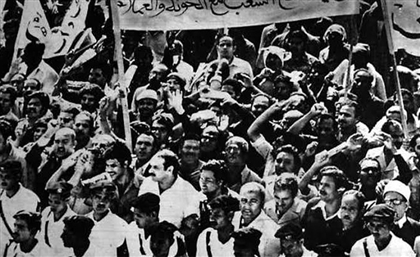The Scrambling of Tahrir
Once the stronghold of the fight for freedom and democracy, Tahrir is now being censored by the very same forces that people rose up against just over three years ago. Find out what happened when Eihab Boraie tried to ask the opinions of passersby...

Egypt is lost, the revolutionary spirit gone, and its freedoms revoked. This is the reality I faced when returning to the site where the dream for a new Egypt began: Tahrir Square.
With various poll numbers being circulated and with all the misinformation and propaganda flooding both private and state media, it is hard to get a real sense of what people on the streets are thinking ahead of them casting their ballots. Many journalists have taken to self censorship, some being eager to support Sisi, while others fear that dissent will lead to detentions. Increasingly frustrated by the foregone conclusion that Sisi will be the next president, I decided to take my videographer, Mahy Sherif, and head to Tahrir in hopes of finding honest and differing views.
Entering Tahrir, the first thing one will observe is that every entrance is heavily guarded with gates of barbed wire that can be shut on a whim, trapping those inside, and leaving it inaccessible to others. Arriving in the middle of the square, it becomes very apparent that this is Sisi’s square. His face adorns every surface imaginable. From posters on poles, massive billboards, to the poor walking around wearing or holding up Sisi signs, it seemed next to impossible to film anything without Sisi's face making an appearance. In sharp contrast, we failed to find even a single poster of his opponent, Hamdeen Sabahi.
We began filming around the square, attempting to talk to as many demographic samples that were willing to answer two specific questions: Who will you be voting for and why? The first pattern that developed was that older citizens had no fear in speaking with us, while younger voters consistently refused to answer questions or to be filmed. The second pattern that developed is that everyone we interviewed overwhelmingly expressed support for Sisi, with the number one answer for why being that he is "a strong man." Every answer was a variation of this theme, and at no point did anyone mention anything about his policies. Of the dozen or so we interviewed, only one person asked made it clear that they didn't care and would not be voting.
Things took a turn for the worse when, at the heart of the midan when I convinced a young couple into telling me who they were voting for. They were very hesitant and refused to appear on video, only allowing their voices to be recorded. Initially, I thought their reservations indicated they were going to tell me they were boycotting or voting Sabahi. However, once I started recording they began singing Sisi's praises, which was suddenly interrupted by a man in civilian clothes demanding our beta2as (national identification), confiscating my camera and microphone, and ordering us to follow him. Given no other option, we reluctantly followed him to meet the lewa (lieutenant).
Waiting for the lewa to show up, I felt an overwhelming amount of guilt for dragging my videographer and the young couple into the mess. I must have explained myself to four different officers until finally the lewa showed up in civilian clothing. Taking the lead, I used broken Arabic to prove that was ignorantly stupid, and that I had no idea we needed a permit, a new policy introduced shortly after the June 30th ouster of Mohamed Morsi. I pleaded and begged that they let us go, but more importantly that they return the identification of the young couple that had done nothing wrong.
Confused and tired of hearing my broken Arabic, the lewa offered us a way out. In exchange for deleting all the videos and recordings, he would let us all go. Considering that all we managed to catch on video were people praising Sisi, I complied immediately. Once I deleted all the recordings we were all let go, but not before telling me that he would now grant me permission to continue filming.
It seemed odd that he would make me delete everything and then give us permission. Confused, I decided to begin recording again, but as soon as we started asking our questions, I noticed that we were being followed, yet again, by an officer in plain clothes. It dawned on me that as long as I was filming here, he would be following me waiting for the right moment to detain us.
Unwilling to find ourselves caught in their claws yet again, the videographer and I decided it would be best to leave, as finding a Sabahi supporter seemed impossible. Considering that a suspicious-looking officer was following us around, it seemed that even if we did find someone they would be less than likely to talk with the possibility of detention hanging over our heads.
In the past, when leaving Tahrir, I recall having this sense of pride, excitement, and optimism for the future. However, leaving Tahrir yesterday, I felt overwhelming disappointment and shame. How did we get to the point where we are more than happy to give up our freedoms and return to the corrupt system we attempted to overthrow? I understand that Egyptians are tired and wish to return to a functioning state, but no one said democracy would be easy.
Before heading to Tahrir, I debated between whether I would boycott the election or vote Sabahi. Although I would rather not give any legitimacy to the election, I realise that boycotts rarely work. I boycotted the last election, and it didn’t seem to matter.
After leaving Tahrir, I realised that boycotting was not enough, I would need to vote Sabahi. Not because I believe or trust him, but because I believe in the idea of electing someone who says he represents left-leaning liberals. Words mean nothing anymore and both candidates can promise whatever they would like; it doesn’t mean they will follow through, especially when they fail to explain how they would implement changes.
So caught between a rock and a hard place, I will vote Sabahi, taking solace in the fact that I am bolstering the opposition leader, encouraging him to continue being an opposing voice, and hoping that he will remain at the forefront of politics, even in defeat.
- Previous Article Heineken Sandbox Line-Up!
- Next Article Come to Terms With Definitions
























